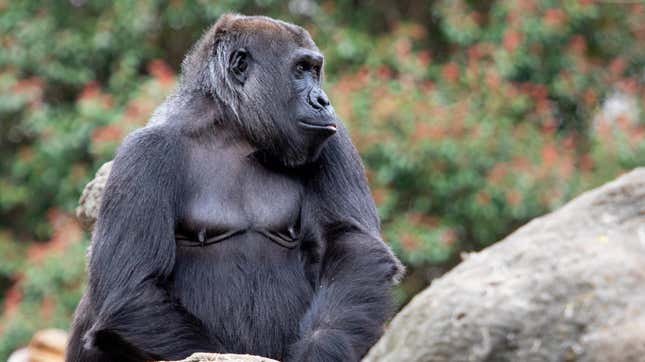
Researchers in Georgia report that gorillas at zoos across the U.S. have come up with a special vocalization—something between a cough and a sneeze—to get the attention of zookeepers when they’re hungry.
“We were observing gorillas in the enclosures, and we were noticing a strange vocalization that was happening at specific times,” Roberta Salmi told Gizmodo in a phone call. Salmi is a biological anthropologist at the University of Georgia and lead author on the study, published in Plos One, characterizing this new vocal trick. “I study Western gorilla civilizations in the wild, and the work that we were observing was not something that I had heard before.”
Salmi and zookeeper Jodi Carrigan began to suspect that this unusual vocalization was an attempt by the gorillas to get the attention of nearby humans, potentially to express their desire for food. The researchers call this call a “snough,” a portmanteau of “sneeze” and “cough,” and devised an experiment to explore why and when these captive gorillas were snoughing. Salmi, Carrigan, and Salmi’s then-student Monica Szczupider used a camcorder and a microphone to study the behavior of eight gorillas at Zoo Atlanta under three conditions.
“In one [condition], we presented the gorillas with just food. We presented the gorilla in the second condition with just the keeper. And then the third condition was the keeper holding food in their hands,” Salmi explained. Zookeepers in the first and third conditions faced away from the cage, in order to ensure that the gorillas would have to get their attention. “What we saw was that during the third condition, the gorillas were producing this very strange call. It’s kind of a mix between a cough and a sneeze, done with a big open mouth. That’s quite rare in gorilla organizations.”
Half of the gorillas observed at Zoo Atlanta snoughed during the project’s trials, and Salmi said that they would continue to snough in the direction of the zookeeper until they received a reaction. The team never observed gorillas snoughing to each other, suggesting the call is only used to get the attention of humans.
That last finding intrigued Simone Pika, a researcher who studies animal cognition and communication at the University of Osnabrück in Germany. Pika, who was not affiliated with the recent work, said in an email that “It is interesting why [the gorillas] do not also use these sounds when communicating with conspecifics, and it would be great to design an experiment where gorillas need to cooperate with another group member to achieve a goal (e.g. get food) and test whether they would use the same sounds or may even invent additional ones.”
But why a snough in the first place? The gorillas could be mimicking sounds related to health. “The snough will trigger the attention and the time of the keepers, because it’s their job to check the health of their animals, so any kind of signs of any disease, then the human goes to see what’s going on,” Salmi speculated.
In addition to their observations at Zoo Atlanta, Salmi and her colleagues solicited photos, videos, and testimonials from gorilla keepers at other zoos using a survey. They found that 18 out of the 39 responses noted the presence of the snough. “The interesting part is that since some of those gorillas outside of Zoo Atlanta didn’t have any interaction with these gorillas, it’s possible that this snough call has been invented multiple times and not only by the Zoo Atlanta gorillas,” noted Salmi.
Interestingly, three of the snoughing female gorillas at Zoo Atlanta are related—Sukari and Kudzoo and sisters, while Mary is Kudzoo’s daughter—and this could be evidence that gorillas pick up the call from each other. “This type of call may be learned during ontogeny,” Salmi said. “So when the individuals are small and they are learning when [to produce] specific calls, they may absorb this novel call and use it.” Salmi said that Mary has since been moved to another institution, and other gorillas around Mary might now socially learn the snough from her.
Other species might also have calls specifically for humans. Cats, for instance, seem to meow mostly to communicate with us. But cats are domesticated and have evolved over millennia to expect care from people, something that’s not true of gorillas, making this finding all the more intriguing.